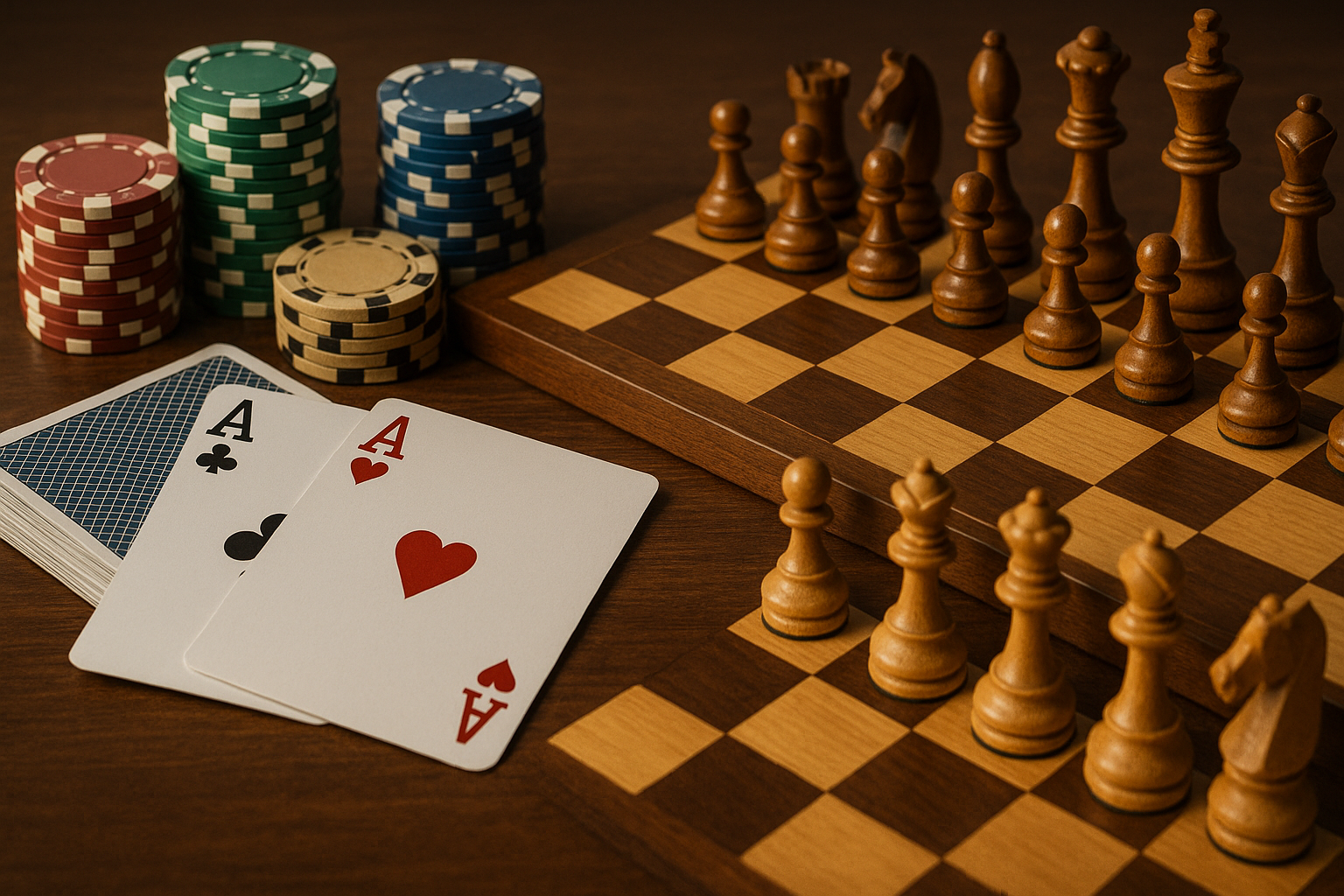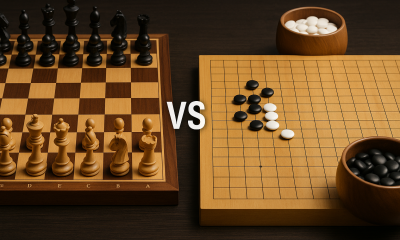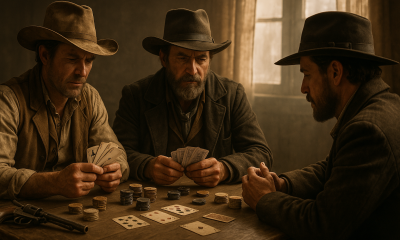Poker
Poker vs. Schach: Ein Vergleich von Strategie und Geschick

Sowohl Poker als auch Schach sind tiefgründige Strategiespiele mit engagierten Communities, jahrzehntelanger Theorie und Weltklasse-Profis. Dennoch fordern sie ganz unterschiedliche kognitive Fähigkeiten. Schach ist ein deterministisches Spiel mit perfekter Information, das auf Berechnung, Mustererkennung und langfristiger Planung basiert. Poker (zum Beispiel No-Limit Texas Hold'em) ist ein stochastisches Spiel mit unvollständigen Informationen, das auf Schlussfolgerungen, Risikomanagement und Psychologie basiert. Die Beherrschung beider Spiele erfordert gründliches Studium, aber die Varianz beim Poker und die kombinatorische Klarheit beim Schach führen zu unterschiedlichen Wegen, auf denen man sein Können unter Beweis stellt.
Wenn Sie den Unterschied zwischen Schach und Go gelesen haben, schauen Sie sich an Schach gegen Go um eine andere Seite des strategischen Vergleichs zu sehen.
1. Spielstruktur und Informationen
Perfekte vs. unvollkommene Informationen
Beim Schach ist jede Figur und jedes Feld für beide Spieler sichtbar – es gibt keine versteckten Informationen. Beim Poker sind Ihre verdeckten Karten und die Reihenfolge der Gemeinschaftskarten verborgen, was zu Unsicherheiten bei der Entscheidungsfindung führt.
Determinismus vs. Varianz
Schach ist deterministisch: Dieselben Züge führen immer zum gleichen Ergebnis. Beim Poker hingegen sorgt die Zufälligkeit der Kartenverteilung für Varianz – selbst perfekt gespielte Hände können also verlieren.
Gleichgewicht und Ausbeutung
In der Pokertheorie bieten **Game Theory Optimal (GTO)**-Strategien eine solide Grundlage, aber echte Gewinne entstehen durch die Ausnutzung der Schwächen der Gegner. Anleitungen wie die von Aufschwung Poker lehren, wie man GTO und ausbeuterisches Spiel kombiniert.
2. Wie Fähigkeiten aussehen
Kernübergänge:
- Mustererkennungsvorrichtung
- Strategische Planung im Zeitverlauf
- Berechnung innerhalb von Beschränkungen
- Emotionale Kontrolle und Disziplin
- Iteratives Studium und Feedback
Beim Schach stehen Präzision und Fehlerminimierung im Vordergrund. Beim Poker stehen Bayes'sches Denken, bereichsbasiertes Denken und Entscheidungsfindung unter Unsicherheit im Vordergrund.
3. Entscheidungsprozesse
Schach: Taktik & Heuristik
Die Entscheidungsfindung im Schach dreht sich um erzwungene Taktiken – Gabeln, Fesselungen, Spieße, entdeckte Angriffe – und positionelle Heuristiken. Einen guten historischen Überblick über die Entwicklung des Schachs finden Sie auf Die Geschichtsseiten von Chess.com.
Poker: Quoten, Equity & Ranges
Pokerentscheidungen basieren auf Pot Odds, Implied Odds und Fold Equity. Man setzt die Gegner auf eine Range und schätzt die Equity. Konzepte wie Bluffen und Balance werden im Artikel „Bluffen beim Poker erklärt"
4. Zeit, Druck und Dynamik
Beim Schach gelten feste Bedenkzeiten (klassisch, Schnellschach, Blitzschach). Zeitnot zwingt zu Kompromissen zwischen Spieltiefe und Sicherheit. Der Druck beim Poker entsteht durch steigende Blinds, Tischdynamik und Ausdauer über lange Sitzungen.
5. Psychologie und Gegnermodellierung
Beim Schach sind psychologische Faktoren zweitrangig – die Leistung muss auf technischer Qualität beruhen. Beim Poker hingegen steht die Psychologie im Mittelpunkt: Image, Tells, Timing und Tilt sind entscheidend. Die Strategieinhalte von Upswing behandeln diese psychologischen Elemente.
6. Trainingstools & Lernmethoden
Schach-Trainingsstapel
- Engine-Analyse (Stockfish, Leela Chess Zero)
- Datenbanken öffnen & Theorie
- Taktische Puzzleübungen
- Kommentierte Klassiker & Endspiele
Poker-Trainingsstapel
- Software zur Überprüfung und Verfolgung des Handverlaufs
- Bereichsanalysatoren/-löser (wie die in Upswing Lab integrierten)
- Statistikverfolgung (VPIP, PFR, 3-Bet-Statistiken)
- Mentales Spieltraining, Bankroll-Systeme
7. Messfähigkeit
Beim Schach werden Wertungen (Elo/Glicko) verwendet, die die Leistung widerspiegeln. Beim Poker:
- Cash Games: Messung der Gewinnrate in bb/100
- Turniere: ROI, ITM-Rate, angepasst an Feldvarianz
- Um den wahren Vorteil zu erkennen, sind große Stichproben erforderlich
8. Glück, Varianz und der langfristige Erfolg
Beim Poker dominiert die Varianz in kurzen Spielphasen; selbst gute Spieler verlieren kurzfristig. Schach bietet weniger Varianz. Bei längerem Spiel zeigt sich Pokergeschick – allerdings nur bei gutem Risiko- und Bankroll-Management.
9. KI, Theorie und sich entwickelnde Metas
Schach-Engines und Evolution
Moderne Engines wie Stockfish und Leela Chess Zero haben die Eröffnungs- und Endspieltheorie dramatisch weiterentwickelt.
Poker-Solver und KI-Strategie
Poker-Solver generieren Basisstrategien und optimale Frequenzen. Viele Upswing-Artikel erläutern die Integration von Solvern in ernsthafte Studien.
10. Professionelle Ökosysteme
Schach unterstützt Titelsysteme (GM, IM), Turniere und Streaming-Inhalte. Das Poker-Ökosystem umfasst Cash-Game-Profis, Turnier-Grinder, Staking-Deals und eine viel steilere Varianzstrecke.
11. Häufige Missverständnisse
„Poker ist Glück“ übersieht langfristige Vorteile. „Schach ist Auswendiglernen“ ignoriert die Bewertungstiefe. „GTO ist alles, was Poker ausmacht“ vernachlässigt, dass man Geld durch die Ausbeutung von Menschen verdient.
12. Crossover-Lektionen
- Von Poker → Schach: Risikobewusstsein, Bayesianische Updates, mentale Gelassenheit bei Unsicherheit
- Von Schach → Poker: Strukturiertes Denken, rigoroses Kalkulieren, Klarheit unter Vereinfachung
13. Welches Spiel ist schwieriger?
Die Antwort hängt von den Abmessungen ab:
- Reines Rechnen & Fehlerempfindlichkeit: Schach ist härter
- Varianz, menschliche Komplexität, Einkommensstabilität: Poker ist härter
- Klares Feedback & messbarer Fortschritt: Schach gewinnt
- Lange mentale Ausdauer unter Unsicherheit: Poker verlangt mehr
14. Praktische Tipps für Anfänger
Wenn Sie neu im Schach sind: Konzentrieren Sie sich auf Taktiken, grundlegende Strategien und wichtige Endspiele.
Wenn Sie neu beim Poker sind: Lernen Sie Hand Ranges und Preflop-Grundlagen. Versuchen Sie die Poker-Strategie Leitfaden für eine frühzeitige Verbesserung.
15. Lektionen jenseits des Tisches
Schach lehrt strukturierte Voraussicht und Ursache und Wirkung. Poker lehrt Anpassungsfähigkeit in Unsicherheit und menschliche Schlussfolgerungen. Im Leben: Manchmal sind alle Informationen sichtbar (Schach); manchmal muss man Schlussfolgerungen ziehen (Poker).
Fazit
Schach und Poker verkörpern beide Strategie auf hohem Niveau. Schach verfeinert die Logik in deterministischen Bereichen; Poker schärft die Fähigkeiten in probabilistischen, gegnerischen Umgebungen. Das Studium beider Disziplinen schärft Ihr Denkvermögen und Ihre Entscheidungsfindung in verschiedenen Kontexten.
Wenn Sie eine längere, SEO-optimierte Version oder Ankerlinks wünschen, kann ich diese als Nächstes generieren.
Lloyd Kenrick ist ein erfahrener Glücksspielanalyst und leitender Redakteur bei Gaming.net. Er verfügt über mehr als 10 Jahre Erfahrung in den Bereichen Online-Casinos, Glücksspielregulierung und Spielersicherheit auf globalen Märkten. Er ist spezialisiert auf die Bewertung lizenzierter Casinos, das Testen von Auszahlungsgeschwindigkeiten, die Analyse von Softwareanbietern und die Unterstützung von Lesern bei der Identifizierung vertrauenswürdiger Glücksspielplattformen. Lloyds Erkenntnisse basieren auf Daten, regulatorischer Forschung und praktischen Plattformtests. Seine Inhalte genießen das Vertrauen von Spielern, die zuverlässige Informationen zu legalen, sicheren und hochwertigen Spieloptionen suchen – egal ob lokal reguliert oder international lizenziert.
Vielleicht gefällt dir
-


Frankreich erwägt Legalisierung von Online-Casinos angesichts des Anstiegs des Schwarzmarktes
-


Geschicklichkeitsspiele könnten Indiens Verbot von Echtgeld-Online-Glücksspielen entgehen
-


Schach gegen Dame: Ein Kampf der Geister über Generationen hinweg
-


Schach gegen Go: Der Kampf der Giganten der perfekten Information
-


Die reale Welt des Pokers: Wie die Popkultur das Spiel geprägt hat
-


Die Rolle des Pokers in der amerikanischen Wildwest-Geschichte